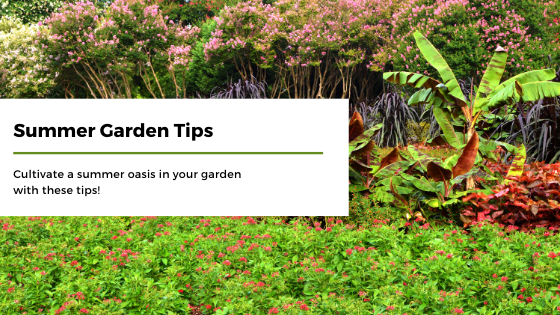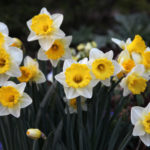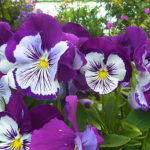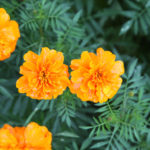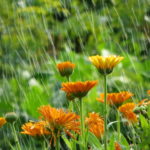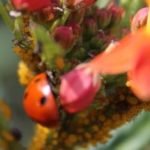Summer Garden Tips
With the first official day of summer approaching quickly, you may notice that your garden is enjoying almost every minute of sunshine that it’s getting. Certain plants are growing like crazy, while others may need to be replaced with something that can withstand the heat. We’ve put together a short list of garden tips to help you tame your garden and keep it looking summer ready!
Planting Tips
- Continue to plant warm season turf grasses such as Bermuda, St. Augustine and Zoysia.
- Plant summer annuals and tropicals. Water them in after planting and keep them watered regularly during the summer heat.
- Plant ground covers and tropical and warm-season annuals such as begonia, hibiscus, periwinkle, portulaca, purslane, salvia, zinnia, coleus, Mexican heather, gomphrena and caladiums.
- Plant pumpkin seeds this month for an autumn harvest of pumpkins.
Pruning Tips
- Prune out any dead or broken branches of woody ornamentals (trees and shrubs) but avoid major pruning during summer heat.
- Begin cutting back any overgrown perennials and annuals to keep growth compact.
- Cut back spent flowers of annuals and perennials to encourage new blooms.
- Prune spent flowers from roses and fertilize if needed according to a soil test.
- Pinch back chrysanthemums to encourage branching.
General Plant Care
- Pay special attention to the watering needs of new lawns, trees and ornamentals as hot, dry weather sets in. Water in the early morning hours (3am to 8am) to minimize fungal problems and reduce evaporation.
- Fertilize annual flowers and vegetables with your favorite fertilizer type to assure continued vigor, based on results from a soil test.
- Check crape myrtles for aphids throughout the summer.
- Mow lawns once per week to maintain good healthy growth and reduce any unnecessary wear and tear on lawn equipment.
- Check ornamentals, flowers and vegetables for spider mites, which are prevalent in warm months.
- Watch for bagworms on junipers, arborvitae and other conifers; treat as needed.
- Watch for webworms on trees, especially pecans and mulberries; treat as necessary.
- Apply fungicide as necessary to control black spot and powdery mildew on roses.
- June is an ideal time to aerate your lawn.
- Check for chinch bugs in St. Augustine lawns throughout the summer and for gray leaf spot fungus in periods of high humidity and temperatures in the 80s and 90s.
- Spot treat fire ant mounds with ant bait or a mound drench.
- Begin to harvest vegetables and fruits as they ripen: potatoes, beans, cucumbers, squash, radishes, tomatoes, blackberries and peaches.
With these tips, your garden is sure to become the lush summer oasis you’ve been hoping for – all that’s left to do is sit in your garden and revel in all your hard work. What are some of your garden goals for this summer? Let us know, and be sure to tag us on social media in any pictures you post if you use these tips!
Related Posts
Comments are closed.


